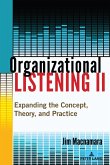Ellis argues that resources are unequally distributed and differences are the norm. Politics is used to manage these differences and although communication is the fundamental tool of conflict management, there are other components in resolving conflicts that complement communication approaches. Dialogue and deliberation are posed as workable responses to untangling these differences and managing intractability.
Dieser Download kann aus rechtlichen Gründen nur mit Rechnungsadresse in A, B, BG, CY, CZ, D, DK, EW, E, FIN, F, GR, HR, H, IRL, I, LT, L, LR, M, NL, PL, P, R, S, SLO, SK ausgeliefert werden.
«Don Ellis' Fierce Entanglements grapples with the problems of ethnopolitical conflict in multicultural societies where resources and privileges are contested. He examines problems and prospects of cultural differences and power from a communication perspective. He shows how dialogue and deliberation are needed to begin to work through such entanglements and give shape to this important literature.» (Richard Buttny, Syracuse University)
«The book's breadth, as evident in its drawing from macro negotiation and diplomacy, meso intergroup and intercultural communication, and micro interpersonal relationships, makes it a tour de force and a must-read for scholars involved in any realm of conflict management.» (Linda L. Putnam, University of California, Santa Barbara)









